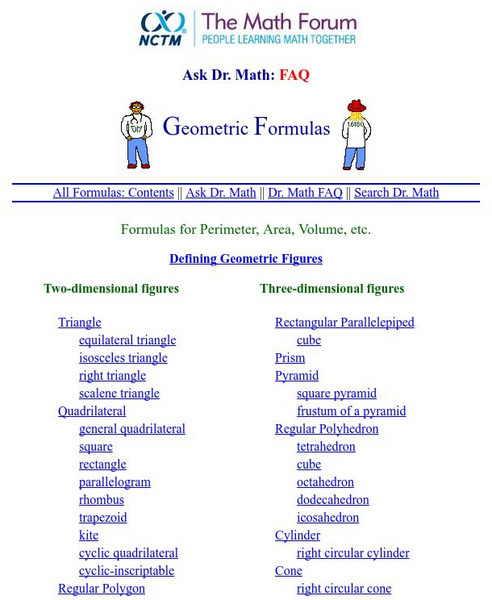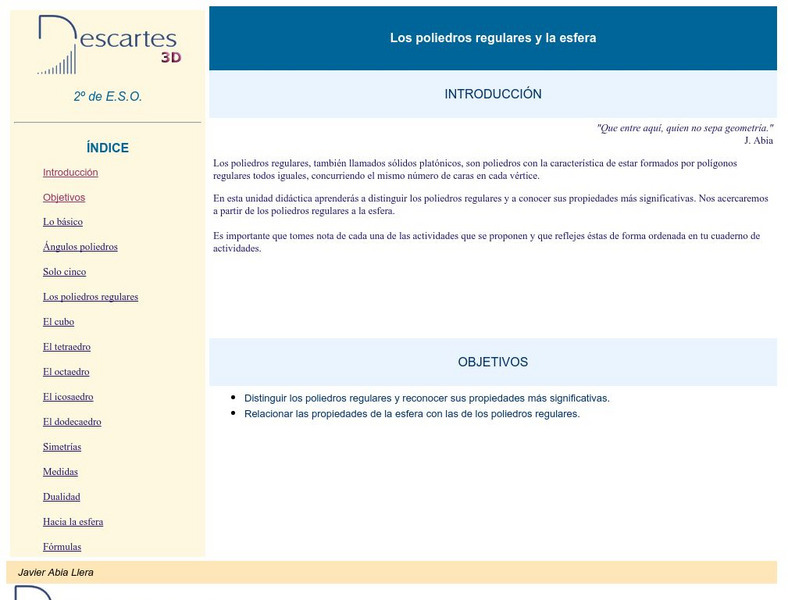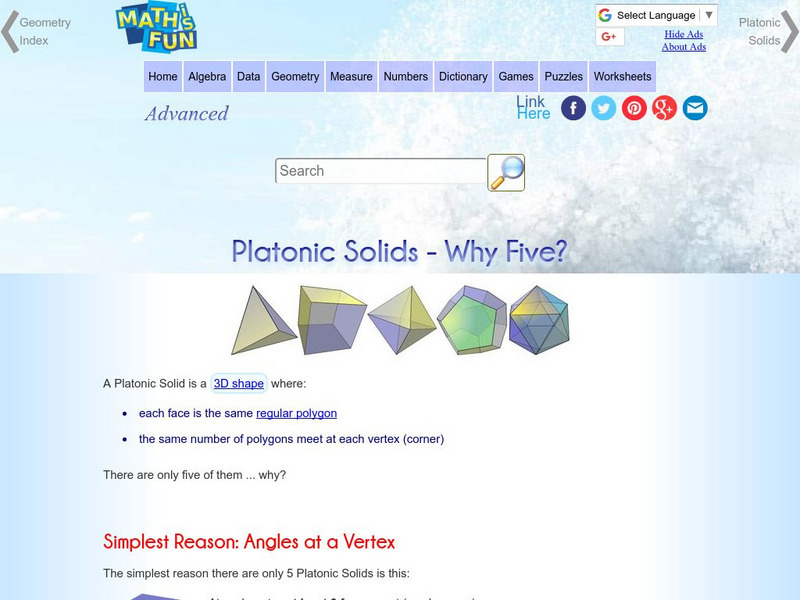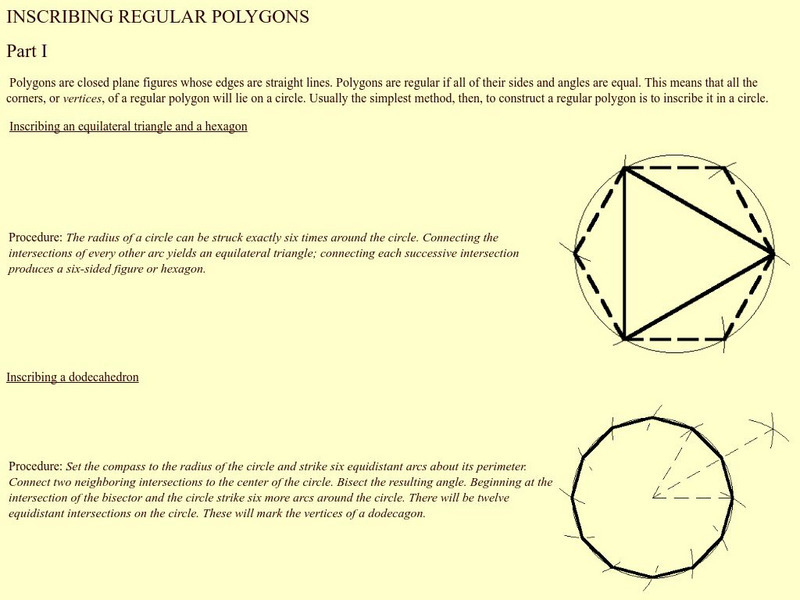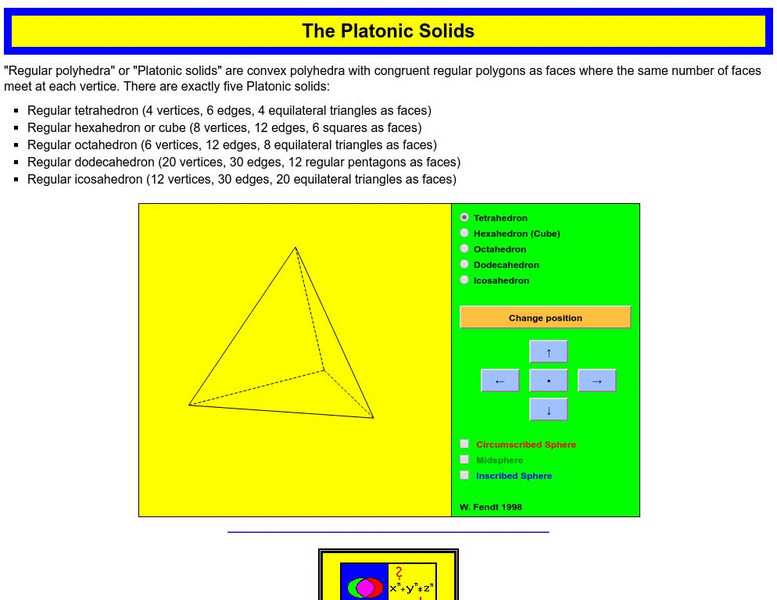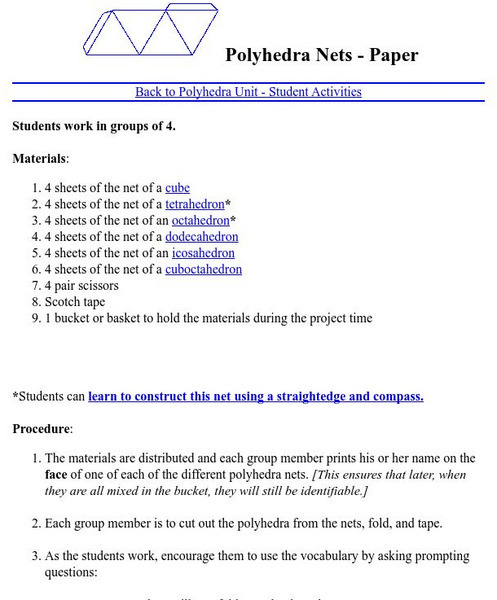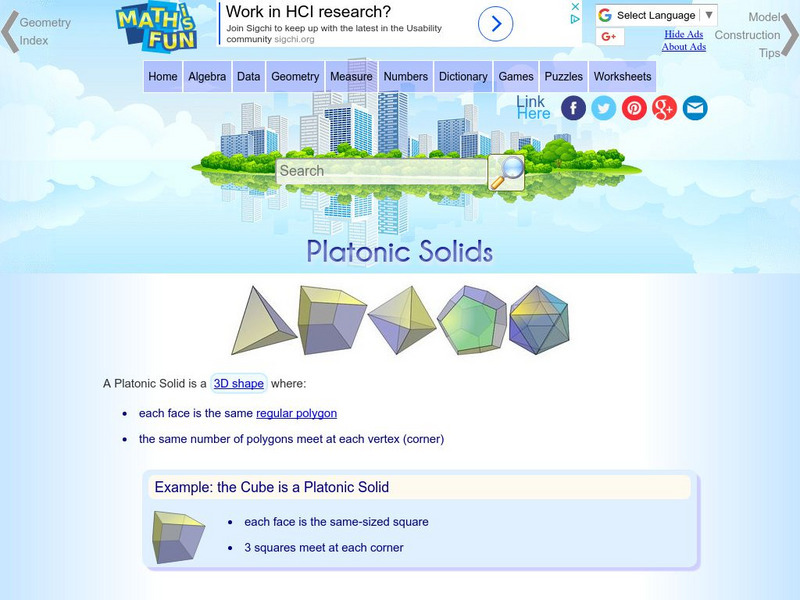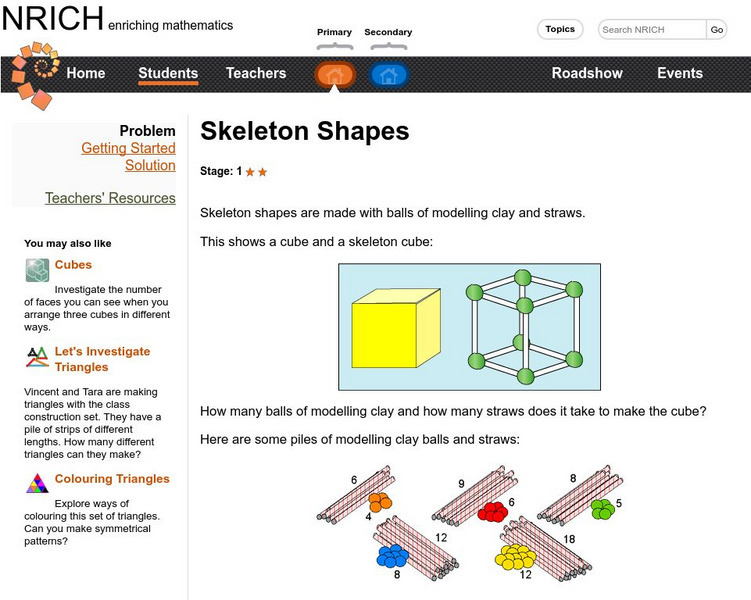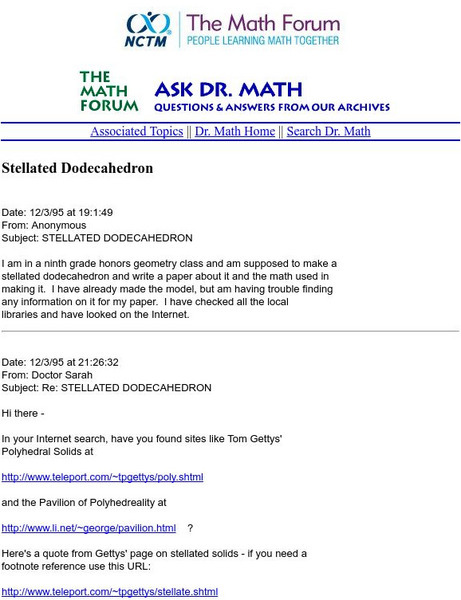Curated OER
It's a Ball, It's a Sphere ... No, It's a Dodecahedron
Third graders construct a dodecahedron that displays facts about two and three-dimensional figures. They use a pattern to construct a dodecahedron after writing facts about geometry onto each of the figure's twelve faces.
National Council of Teachers of Mathematics
The Math Forum: Ask Dr. Math: Faq, Geometric Figures
This page brings you to a table of contents of three-dimensional figures. Selecting a figure will bring you to a page defining and illustrating the figure with applicable formulas listed.
Cool Math
Coolmath: Coolmath4kids: Polyhedra Gallery
A gallery of complex polyhedra with descriptions and characteristics.
Cuemath
Cuemath: Platonic Solids
Learn more about platonic sold geometry, understand the platonic solid names, view some solved examples, and try your hand at some interactive problems.
National Council of Teachers of Mathematics
The Math Forum: Studying Polyhedra
This site not only defines what a polyhedron is, but it allows you to view each of the five regular polyhedra through an interactive exercise. After selecting which polyhedron you'd like to see, it will tell you its name and how many...
Ministry of Education and Universities of the Region of Murcia (Spain)
Ministerio De Educacion Y Ciencia: Los Poliedros Regulars Y La Esfera
Interactive resources and activities dealing with properties and characteristic of the five polyhedrons and the sphere.
Oswego City School District
Regents Exam Prep Center: Platonic Solids
Did you know that the five regular platonic solids (tetrahedron, octahedron, icosahedron, cube, and dodecahedron) were thought to represent earth, air, fire, water, and the universe? This chart shows an image and provides a description...
PBS
Pbs: Mathline: Let's Face It [Pdf]
Check out this math project about polyhedra! Young scholars will enjoy the hands-on activity while they learn about tetrahedrons, hexahedrons, octahedrons, dodecahedrons, and icosahedrons. [Requires Adobe Reader.]
Math Is Fun
Math Is Fun: Platonic Solids: Why Five?
Use Euler's Formula and properties of known platonic solids' faces, edges, and vertices to determine why only five platonic solids exist.
Oswego City School District
Regents Exam Prep Center: Polyhedra
View and learn about five different polyhedra: tetrahedron, octahedron, icosahedron, hexahedron, and dodecahedron. Learn what Euler's Polyhedra Theorem is, and see examples of non-polyhedra as well.
Depaul University
Depaul University: Inscribing Regular Polygons
In this lesson, students learn to inscribe regular polygons inside a circle.
University of Georgia
University of Georgia: Inter Math: Platonic Solids
This site gives a description of platonic solids along with a visual representation of each of the five platonic solids. At the bottom of the page are links to cut-out-templates for each of the platonic solids. Be sure to follow the...
Walter Fendt
Walter Fendt: The Platonic Solids
A short interactive activity to visualize the different platonic solids. You can also change the axis of rotation.
Creative Science Centre
Creative Science Centre: Shapes Platonic and Archimedean Solids
The 'Platonic solids' are three-dimensional shapes formed by putting together identical regular faces. Every corner and every edge is identical to every other corner and edge. There are five such 'solids': the tetrahedron, cube,...
Mathigon
Mathigon: Geometry: Polygons and Polyhedra: Platonic Solids
A Platonic solid is a polyhedron made up of only one kind of regular polygon, that looks the same from every direction. (In other words, the same number of faces meet at every vertex.) There are only five different Platonic solids:...
National Council of Teachers of Mathematics
The Math Forum: Ask Dr. Math: Polyhedra Classification
This question and answer site provides a lot of basic information about polyhedra. The five regular polyhedra, "The Platonic Solids," are described.
NumberNut
Number Nut: Shapes, Symbols, and Colors: 3 D Shapes
This lesson describes three dimensional shapes and provides two interactive practice activities.
Other
Platonic Realms: The Irrationality of the Square Root of Two
An informative resource on the nature of Platonic Solids and what constitutes these figures.
Other
Polyhedra: The Five Platonic Solids
A brief site that includes some activities to understand the figures.
National Council of Teachers of Mathematics
The Math Forum: Polyhedra Nets Paper
Contains six examples of polyhedra nets (cube, tetrahedron, octahedron, dodecahedron, icosahedron, cubosctahedron).
Math Is Fun
Math Is Fun: Making 3 D Solids
This tutorial features templates and instructions to make the following solids: tetrahedron, cube, octahedron, dodecahedron, and icosahedron.
Math Is Fun
Math Is Fun: Spinning Dodecahedron
Students learn about the terminology and formulas associated with a dodecahedron. The learning resource consists of definitions and an interactive spinning dodecahedron.
University of Cambridge
University of Cambridge: Nrich: Skeleton Shapes
At this one page website a variety of polyhedra are shown. The challenge is to create the skeleton for each polyhedron and identify the needed materials. You can check your solution right at the website.
National Council of Teachers of Mathematics
The Math Forum: Ask Dr. Math: Stellated Dodecahedron
This question and answer site provides information about stellated dodecahedrons, as well as several internet links to this topic.



